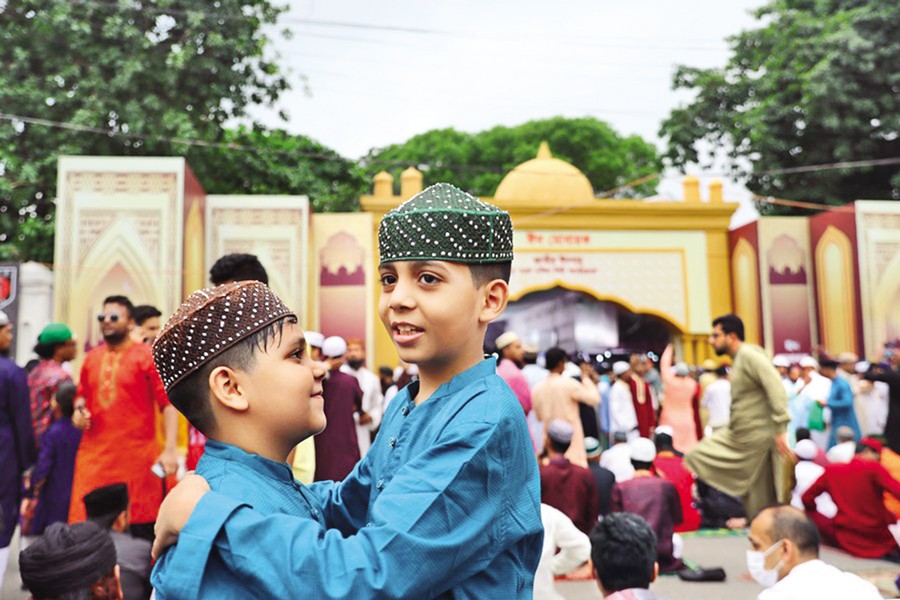
Published :
Updated :

Subject to the sighting of the moon for the month of Shawwal, the holy month of Ramadan will end and Eid-ul-Fitr will be observed across the country on Wednesday or Thursday. The appearance of the faint and fleeting crescent in the evening sky will be celebrated with a joyous spirit. Congregational prayers will be held in the morning, greetings will be exchanged, and the people, especially children and youth will don their finest dresses as part of the festivity. It's probably the most exciting day of the year for the children, especially.
Eid-ul-Fitr, the greatest religious festival for Muslims, marks the end of practising self-restraint and self-purification through fasting and other religious rituals during the holy month of Ramadan. It brings peace and happiness to all Muslims who celebrate it with festivity and religious fervour and also strengthens and unites communities.
Eid is seen as an Islamic festival, but it's much more than that. It's a festival for Muslims no doubt, but as a major religious celebration, its horizon is much broader and encompasses an entire society, composed of many different communities. Eid, with its message of peace and brotherhood, unites the people both at intra-communal and inter-communal levels. Apart from the religious rites, there are family-orientated joyful events and festivities that brighten up society as a whole.
This year, however, the festival could have been more pleasurable and fun had it not been for some unenthusiastic factors. The holy month of Ramadan specifically instructs Muslims to follow a definite code of conduct both in their personal and social life. It advises devotees to refrain from all wrongdoings and encourages them to practice self-restraint. It flows from these teachings that traders should be fair in their business and refrain from doing unethical transactions. But contrary to the spirit of Ramadan, dishonest sections of the traders use the month to maximise their profit by adopting various unfair means.
Most of the transport owners, too, take advantage of the people's need to return to their ancestral homes and be reunited with their families. They squeeze exorbitant fare from them, apparently without feeling any guilt. The combined effect of these factors casts a pall of gloom over the spirit of the holidaymakers. It is due to these depressing factors that the festival would not be as joyful for many as it could be.
Besides, Eid had never been nor is it ever likely to be joyful for people crushed under grinding poverty. Islam urges Muslims to share Eid happiness with poorer sections of society. But, regrettably, the tendency to monopolise happiness seems stronger than sharing it. There are no government programmes to make the Eid festival happier for the slum dwellers, street children, and other sections of the destitute. Nor are affluent sections of society coming forward with benevolent objectives. Eid is full of happiness, but seemingly only for a section of society.
It is the duty of the government to plan and make Eid meaningful for the poor and destitute members of society. Besides, the well-off sections of society should not forget their social responsibility; they should extend a helping hand to the poor if they really want to establish the basic teachings of Islam in their own life.
Let us pray for the day when Eid will be a festival of happiness that embraces all and not have the poor, homeless, and destitute on the outside looking in.
Eid Mubarak!


 For all latest news, follow The Financial Express Google News channel.
For all latest news, follow The Financial Express Google News channel.